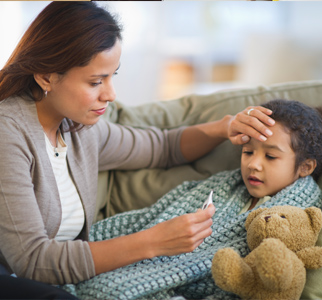Not All Fevers Need Treatment
If you’re like most parents, your anxiety level rises along with your child’s temperature. Fever is a warning sign that your child may have an illness that needs attention. But the American Academy of Pediatrics (AAP) stresses that fever itself is usually not a problem. In fact, it can be helpful.

Fever is a sign that the body is combating an infection. It helps kill bacteria and viruses. It also boosts production of infection-fighting white blood cells. There’s generally no need to worry about bringing a fever down unless it’s causing your child discomfort.
To treat or not to treat
A hand on your child’s forehead may be soothing, but it isn’t an accurate gauge of temperature. The AAP recommends you use a digital thermometer. It’s best to take the temperature rectally for children ages 3 and younger. A rectal temperature more than 100.4°F (38°C) is considered a fever. When taken orally, a temperature higher than 99.5°F (37.5°C) is diagnosed as a fever.
A child who is eating and sleeping well and having playful moments often doesn’t need any fever-lowering treatment. But call your child’s healthcare provider in these cases:
Age 3 months or younger: Rectal temperature of 100.4°F (38°C) or higher
Younger than age 2: Fever lasts more than 24 hours
Ages 2 and older: Fever lasts more than 72 hours
Any age: Fever repeatedly goes higher than 104°F (40°C) or is accompanied by other symptoms, such as having a seizure, severe sore throat, severe ear pain or headache, unexplained rash, repeated vomiting or diarrhea, unusual sleepiness, or very fussy behavior
Managing a child’s fever
When a fever is making your child uncomfortable, these steps may help:
Dress your child lightly to keep from overheating. Keep the room comfortably cool.
Encourage your child to drink extra fluids to prevent dehydration. Water, diluted fruit juice, and electrolyte solutions are good choices.
Discourage overexertion. But it’s OK for your child to get out of bed and play calmly.
You may also want to consider using acetaminophen or ibuprofen to reduce a fever above 102°F (38.9°C). For children younger than 2 years old, call the healthcare provider or pharmacist to find out how much medicine to give your child. For older children, follow label instructions.
Check with the healthcare provider before giving acetaminophen to a baby younger than 3 months. Ibuprofen should only be given to a baby older than 6 months. Don’t give ibuprofen to a dehydrated or vomiting child.
Don’t give aspirin to children—or teens. Its use by young people with viral illnesses has been linked to side effects ranging from stomach upset to Reye syndrome, a rare but serious disease that can harm the body, especially the liver and brain.
Connect with us:
Download our App: